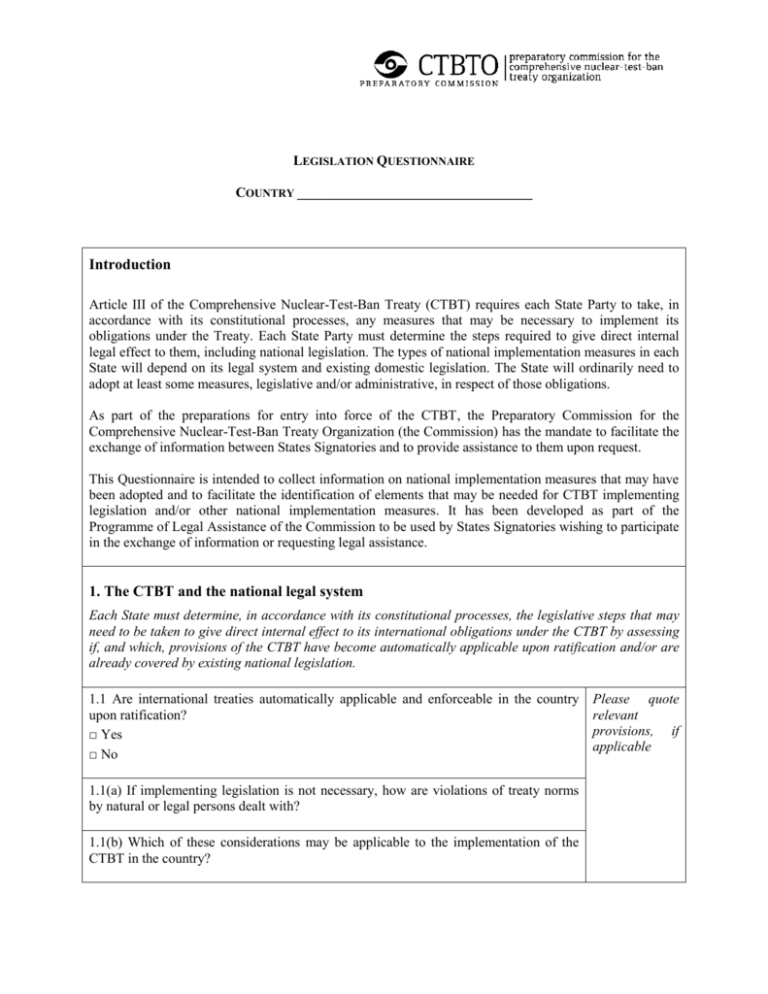DOC - Ctbto
advertisement

LEGISLATION QUESTIONNAIRE COUNTRY __________________________________ Introduction Article III of the Comprehensive Nuclear-Test-Ban Treaty (CTBT) requires each State Party to take, in accordance with its constitutional processes, any measures that may be necessary to implement its obligations under the Treaty. Each State Party must determine the steps required to give direct internal legal effect to them, including national legislation. The types of national implementation measures in each State will depend on its legal system and existing domestic legislation. The State will ordinarily need to adopt at least some measures, legislative and/or administrative, in respect of those obligations. As part of the preparations for entry into force of the CTBT, the Preparatory Commission for the Comprehensive Nuclear-Test-Ban Treaty Organization (the Commission) has the mandate to facilitate the exchange of information between States Signatories and to provide assistance to them upon request. This Questionnaire is intended to collect information on national implementation measures that may have been adopted and to facilitate the identification of elements that may be needed for CTBT implementing legislation and/or other national implementation measures. It has been developed as part of the Programme of Legal Assistance of the Commission to be used by States Signatories wishing to participate in the exchange of information or requesting legal assistance. 1. The CTBT and the national legal system Each State must determine, in accordance with its constitutional processes, the legislative steps that may need to be taken to give direct internal effect to its international obligations under the CTBT by assessing if, and which, provisions of the CTBT have become automatically applicable upon ratification and/or are already covered by existing national legislation. 1.1 Are international treaties automatically applicable and enforceable in the country Please quote upon ratification? relevant provisions, if □ Yes applicable □ No 1.1(a) If implementing legislation is not necessary, how are violations of treaty norms by natural or legal persons dealt with? 1.1(b) Which of these considerations may be applicable to the implementation of the CTBT in the country? 2. CTBT Implementing Legislation To be completed when CTBT implementing legislation has been, or is in the process of being, adopted. The term “legislation” is used in a large sense to include laws, decrees, orders, resolutions, etc. 2.1 Has the country adopted implementing legislation for the OR CTBT? 2.1 Is the country in process of drafting Please tick the implementing legislation for the CTBT? applicable box(es) and provide copy of relevant □ Yes □ Yes legislation or □ No □ No draft, if applicable 2.2 If yes, which of the following approaches has been or will be followed? □ Comprehensive or partial parliamentary statute on the CTBT □ Amendment of the penal code □ Decree or regulation of the executive branch □ Administrative resolution □ Other, please explain 2.3 In case of affirmative response to 2.1 and/or 2.2, which of the following elements are covered in the legislation or draft legislation? □ Prohibition of nuclear explosions □ Establishment of sanctions: (a) criminal sanctions; (b) administrative fines □ Extradition and/or mutual legal assistance □ Establishment of the National Authority □ Privileges and immunities of the CTBTO and/or the Preparatory Commission □ Regulation of the facilities of the International Monitoring System □ Consultation and clarification process regarding treaty compliance □ Confidence-building measures regarding chemical explosions □ On-site inspections □ Confidentiality □ Other, please explain 3. The CTBT and other international instruments When assessing national measures or legislation that may be needed to implement the CTBT, a State may need to take into account legislation already adopted or being drafted to implement other related international instruments to avoid overlaps and ensure a proper coordination of legislative provisions. 3.1 Has the country adopted, or is the country in the process of adopting, implementing Please explain legislation for other international instruments in the fields of nuclear security, counterterrorism or weapons of mass destruction? 2 3.2 If yes, has the country included aspects of CTBT implementation in the legislation thus adopted or being drafted? Please explain 4. Prohibition of Nuclear Explosions (Art. III.1) Article III of the Treaty requires that each State Party take any necessary measures: a) to prohibit natural and legal persons anywhere on its territory or in any other place under its jurisdiction as recognized by international law from undertaking any activity prohibited to a State Party under the Treaty; b) to prohibit natural and legal persons from undertaking any such activity anywhere under its control; and c) to prohibit, in conformity with international law, natural persons possessing its nationality from undertaking any such activity anywhere. 4.1 Conducting a nuclear explosion: has this activity been prohibited as a criminal offense under national legislation? Please quote relevant provisions, if applicable 4.1(a) If yes, please specify the scope of the prohibition: Please tick the applicable box(es) □ Natural persons □ State officials, including the military □ Legal persons □ Nationals abroad □ Foreigners in the national territory □ Attempt – preparatory acts □ Accomplices 4.1(b) If yes, please specify the penalties provided: Please quote relevant provisions, if applicable 4.1(c) If not, are there any prohibitions or offenses prescribed in national legislation that Please quote may be invoked to prosecute person(s) responsible for the conduct of a nuclear relevant explosion? provisions, if applicable 4.1(d) What gaps may be identified in these provisions? □ State officials, including the military □ Legal persons □ Nationals abroad □ Foreigners in the national territory □ Attempt – preparatory acts 3 Please tick the applicable box(es) □ Accomplices □ Conditionality (i.e. terrorist intent, death, injury to person, property damage, damage to environment, etc.) □ No (serious) criminal penalties □ Other, please explain 5. Legal Assistance (Art. III.2) Pursuant to Article III, paragraph 2, of the CTBT, States Parties shall cooperate with one another and afford the appropriate form of legal assistance to facilitate the implementation of their obligations under the CTBT. 5.1 May the country provide legal assistance to other States Parties of the CTBT in the Please quote absence of bilateral or multilateral mutual legal assistance agreements? relevant provisions, if applicable 5.1(a) If yes, what forms of legal assistance may be provided? □ Taking evidence or statements □ Location of suspects, assistance in investigations □ Servicing judicial documents □ Searches and seizures □ Providing information and evidentiary items □ Extradition of suspects □ Other, please explain 5.1(b) If not, what are the requirements for the provision of legal assistance? Please tick the applicable box(es) Please quote relevant provisions, if applicable 6. National Authority (Art. III.4) Under Article III, paragraph 4, of the CTBT each State Party is required to designate or set up a National Authority to “serve as the national focal point for liaison with the Organization and with other States Parties.” 6.1 How will the National Authority be designated in the country in order to be able to exercise the functions required or implied in the CTBT? □ Parliamentary statute □ Decree or regulations of the Executive Branch □ Ministerial resolution □ Administrative decision of competent authority 4 Please quote relevant provisions, if applicable 7. Verification regime The CTBT requires States Parties to facilitate verification of compliance with its provisions, including, as necessary, to participate in consultation and clarification processes; to participate in confidence-building measures; to allow the conduct on-site inspections in its territory; and, for States hosting IMS facilities, to facilitate the establishment and operation of stations and provision of data from them to the IDC in Vienna. 7.1 Has the executive branch the authority to provide information to the CTBTO and Please quote States Parties in connection to the implementation of CTBT obligations? relevant provisions, if applicable 7.2 Has the executive branch the authority to request information from other national institutions and from private parties in connection to the implementation of CTBT obligations? Please quote relevant provisions, if applicable 7.3 In relation to on-site inspections, can the following provisions be applied in the Please tick the country under the current laws and regulations? (Art. IV.D, Protocol, Part II) applicable box(es) 7.3(a) In relation to standing arrangements: □ Issuance of visas for inspectors and inspection assistants □ Privileges and immunities for inspectors and inspection assistants □ Issuance of a standing diplomatic clearance number for non-scheduled aircraft transporting the inspection team and equipment 7.3(b) In relation to the conduct of an on-site inspection: □ Accept an on-site inspection □ Grant timely entry of the inspection team at the point of entry □ Allow import of equipment brought by the inspection team □ Grant access to site(s) including private property □ Allow the conduct of inspection activities □ Permit overflights of aircraft surveillance 7.4. Has the executive branch the authority to enter into agreements with the CTBTO in Please quote order to regulate the modalities of cooperation for the installation and operation of relevant facilities of the International Monitoring System? provisions, if applicable 5 8. Collaboration with the Preparatory Commission Due to the extensive activities required to be taken by the Preparatory Commission and States Signatories to establish and provisionally operate the International Monitoring System and the International Data Centre during the preparatory phase, some measures are needed to enable cooperation with the Preparatory Commission before entry into force. 8.1 Is a regulatory or administrative measure necessary or advisable in order to ensure Please quote the recognition of the legal personality, privileges and immunities of the Preparatory relevant Commission in the country? provisions, if applicable 8.2 What are the applicable administrative procedures to ensure exemption from taxes Please quote and customs duties and restrictions for the Preparatory Commission in the country? relevant provisions, if applicable 8.3 What national institutions are involved in collaborating with the Preparatory Please quote Commission during the preparatory phase? relevant provisions, if applicable 8.4 Has your country designated a National Authority? How does it interact with the other entities listed above (if any)? 8.5 Has a National Data Centre (NDC) been established? What is its relation/link to the National Authority? 8.6 Is a formal designation (i.e. resolution, decree, etc.) of the National Authority in the Please quote country necessary or advisable during the preparatory phase to ensure a proper relevant provisions, if collaboration with the Preparatory Commission? applicable 9. Administrative procedures for preparing implementing legislation 9.1 Please briefly describe which entity/entities was/were or will be responsible for the Please drafting of implementing legislation and which consultation processes were or will be complete, established, if any. applicable 6 as




